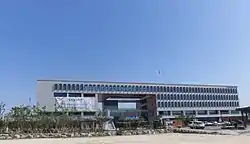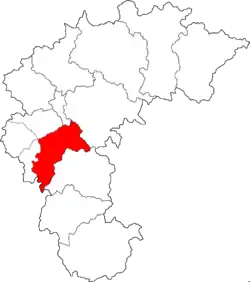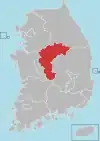Sangdang-gu
상당구 | |
|---|---|
| Korean transcription(s) | |
| • Hangul | 상당구 |
| • Hanja | 上黨區 |
| • Revised Romanization | Sangdang-gu |
| • McCune–Reischauer | Sangdang-gu |
 Sangdang-gu office | |
 | |
| Coordinates: 36°39′4″N 127°29′12″E / 36.65111°N 127.48667°E | |
| Country | South Korea |
| Region | Hoseo |
| Province | North Chungcheong |
| City | Cheongju |
| Administrative divisions | 5 myeon and 8 dong |
| Area | |
| • Total | 404.44 km2 (156.16 sq mi) |
| Population (2014) | |
| • Total | 180,272 |
| • Density | 450/km2 (1,200/sq mi) |
| • Dialect | Chungcheong |
| Website | cheongju.go.kr |
Sangdang-gu (Korean: 상당구; Hanja: 上黨區) is a non-autonomous district in the city of Cheongju in North Chungcheong Province, South Korea. Sangdang-gu was re-established from a part of Sangdang-gu and a part of Cheongwon-gun in July 2014. The newly created Cheongwon-gu annexed the part of Sangdang-gu.[1]
Archaeology
The Hungsu Child was found in the Turubong limestone cave located in Munui-myeon.[2]
Administrative divisions
Sangdang-gu is divided into 5 townships (myeon) and 8 neighborhoods (dong).
| Hangul | Hanja | |
|---|---|---|
| Nangseong-myeon | 낭성면 | 琅城面 |
| Miwon-myeon | 미원면 | 米院面 |
| Gadeok-myeon | 가덕면 | 加德面 |
| Namil-myeon | 남일면 | 南一面 |
| Munui-myeon | 문의면 | 文義面 |
| Jungang-dong | 중앙동 | 中央洞 |
| Seongan-dong | 성안동 | 城安洞 |
| Tap-dong Daeseong-dong | 탑대성동 | 塔洞 大成洞 |
| Yeongun-dong | 영운동 | 永雲洞 |
| Geumcheon-dong | 금천동 | 金川洞 |
| Yongdam-dong Myeongam-dong Sanseong-dong | 용담명암산성동 | 龍潭洞 明岩洞 山城洞 |
| Yongam-dong | 용암1동 | 龍岩洞 |
| 용암2동 |
References
- ↑ 인구 84만명 통합 청주시 출범, The Hankyoreh, June 30, 2014.
- ↑ "흥수아이(興洙─) - 한국민족문화대백과사전". encykorea.aks.ac.kr. Retrieved 2021-08-21.
External links
- (in Korean) Official website
This article is issued from Wikipedia. The text is licensed under Creative Commons - Attribution - Sharealike. Additional terms may apply for the media files.
